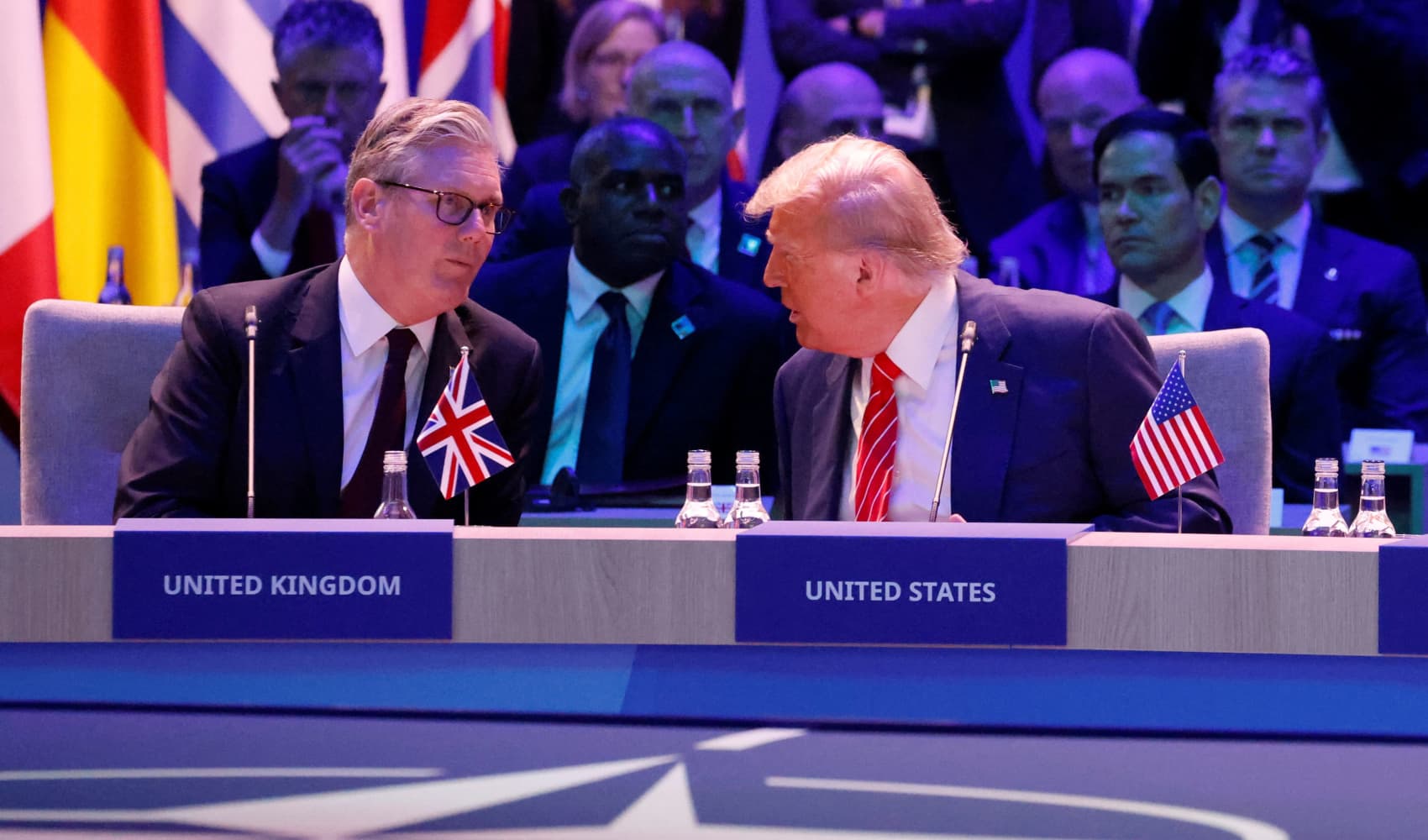Asia-Pacific markets trade mixed as investors assess gains on Wall Street and Trump's tariff plans
This is CNBC's live blog covering Asia-Pacific markets.
Asia-Pacific markets traded mixed Tuesday as investors assessed the record gains on Wall Street and the global impact of U.S. President Donald Trump's tariff policies as his 90-day tariff reprieve is set to expire next week.
U.S. Treasury Secretary Scott Bessent said on Monday that there are "countries that are negotiating in good faith." However, he added that tariffs could still "spring back" to the levels announced on April 2 "if we can't get across the line because they are being recalcitrant."
Mainland China's CSI 300 added 0.18% in its final hour of trade. The Asian giant's Caixin/S&P Global manufacturing purchasing manager's index reading for June came in at 50.4, higher than the 49 predicted by analysts polled by Reuters.
Japan's Nikkei 225 benchmark fell 1.24% after hitting an over 11-month high in its previous session, while the broader Topix index declined by 0.74% in its final hour.
In South Korea, the Kospi index rose 0.58% in its last hour, while the small-cap Kosdaq added 0.28%.
Over in Australia, the S&P/ASX 200 ended the day flat at 8,451.10.
Meanwhile, India's benchmark Nifty 50 and BSE Sensex were flat.
Hong Kong markets are closed for a public holiday.
U.S. stock futures fell in Asian hours after two of the three key benchmarks on Wall Street notched another record close in Monday's session.
Overnight stateside, the broad-based S&P 500 index gained 0.52% and ended at 6,204.95 while the Nasdaq Composite advanced 0.47% and also reached fresh all-time highs, at 20,369.73. The Dow Jones Industrial Average climbed 275.50 points, or 0.63%, settling at 44,094.77.
Monday's rise comes as Canada rescinded its digital service tax in an effort to facilitate trade negotiations with the U.S. That's after President Donald Trump said last Friday that the U.S. was "terminating ALL discussions on Trade with Canada." Initial payments on the tax were set to begin Monday and would have applied to companies such as Google, Meta and Amazon.
— CNBC's Sean Conlon and Pia Singh contributed to this report.
Shares of Chiba Kogyo Bank surged as much as 25.15% Tuesday after local media outlet NHK reported that it is "arranging for business integration" with fellow Japanese regional lender Chiba Bank.
Meanwhile, shares of Chiba Bank rose 3.45%.
Chiba Bank holds a 19.97% stake in Chiba Kogyo Bank after acquiring shares from the latter in late March for approximately 23.7 billion yen ($164.99 million).
— Amala Balakrishner
Asia-Pacific currencies mostly appreciated against the greenback on Tuesday amid uncertainties over U.S. President Donald Trump's policies, including his spending bill and tariff plans.
The U.S. dollar index, which measures the greenback against six major currencies, fell 0.13% to 96.745 as of 1.25 p.m. Singapore time.
The Japanese yen, which is traditionally viewed as a safe asset during times of tumult, strengthened 0.23% against the dollar to 143.68.
Similarly, the Indian rupee appreciated 0.11% against the dollar to 85.59, while China's offshore yuan strengthened marginally by 0.01% against the dollar to 7.5175.
The Australian dollar also strengthened 0.11% against the dollar to 0.6573, as did the Taiwanese dollar, which edged 0.07% higher to 29.161.
Meanwhile, the South Korean won depreciated 0.03% against the dollar to 1,352.82.
Elsewhere in Southeast Asia, the Singapore dollar was largely unchanged against the greenback at 1.2715, while the Thai baht weakened by 0.15% to 32.46.
The Philippine peso strengthened marginally by 0.08% to 56.23, while the Malaysian ringgit gained 0.48% to 4.19.
— Amala Balakrishner
Manufacturing activity in South Korea contracted for the fifth consecutive month in June as firms reported sustained, albeit slower, contractions in output and new order intakes, data from a private sector survey released Tuesday showed.
The S&P 500 Global South Korea Manufacturing Purchasing Managers' Index rose to 48.7 in June, from 47.7 in the month before. The reading also came in below the 50-point mark separating growth from contraction for the fifth consecutive month.
The lower reading also followed a decline in purchasing activity following a reluctance to hold excess inventories as well as a fall in employment, the survey results showed.
Looking ahead, Usamah Bhatti, economist at S&P Global Market Intelligence says the outlook for the coming months "appears mixed," as firms reported a moderate decline in employment alongside decreasing levels of outstanding business, and a pick up in sentiment.
— Amala Balakrishner
Manufacturing activity in Japan rose in June for the first time in 13 months on the back of higher output. However, demand remained weak as new orders and export sales continued to decline, data from a private sector survey released Tuesday showed.
The au Jibun Bank flash Japan Manufacturing Purchasing Managers' Index rose to 50.4 in June, coming in above the 50-point mark separating growth from contraction for the first time since May 2024.
June's reading also surpassed the 49.4 seen in May.
"The latest PMI data signalled that demand conditions remained challenging for Japanese manufacturers in June, with firms recording further drops in sales both at home and overseas," Annabel Fiddes, economics associate director at S&P Global Market Intelligence wrote in a Tuesday note.
"We will need to see a renewed and sustained improvement in customer demand, which remains dampened by ongoing uncertainty regarding US tariffs, in order to see a sustained recovery in production," she added.
— Amala Balakrishner
Business sentiment among large Japanese manufacturers improved in the three months to June, the Bank of Japan's quarterly Tankan survey showed.
The headline index measuring big manufacturers' business confidence came in at +13 in June, up from +12 in March and the +10 forecasted by analysts polled by Reuters.
Meanwhile, a separate index gauging sentiment among big non-manufacturers edged down to +34 from +35 in March, in line with analysts' predictions.
The Tankan survey, which calculates the difference between companies that have optimistic business outlooks vs. those that hold negative sentiments, is a closely watched indicator by Japan's central bank. The BOJ will take the findings of the survey, among others, into consideration when reviewing its monetary policy stance at its meeting between 30 and 31 July.
— Amala Balakrishner
Japan's Nikkei 225 fell in early trade Tuesday, reversing course from its over 11-month high in its previous session.
The 225-stock share average fell 0.67% to hit 40,233.53 at 9.10 a.m. local time, while the broader Topix index moved down 0.3% to 2,844.27.
— Amala Balakrishner
Asia-Pacific markets were set to open lower on Tuesday.
Japan's benchmark Nikkei 225 was set to open lower, with the futures contract in Chicago at 40,330 while its counterpart in Osaka last traded at 40,250, against the index's Monday close of 40,487.39.
Australia's S&P/ASX 200 is set to open marginally lower with futures tied to the benchmark at 8,531 compared to its last close of 8,542.30.
Hong Kong markets were closed for a public holiday.
— Amala Balakrishner












